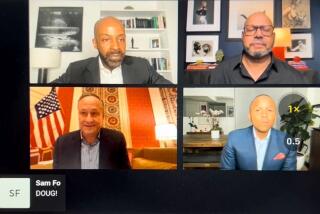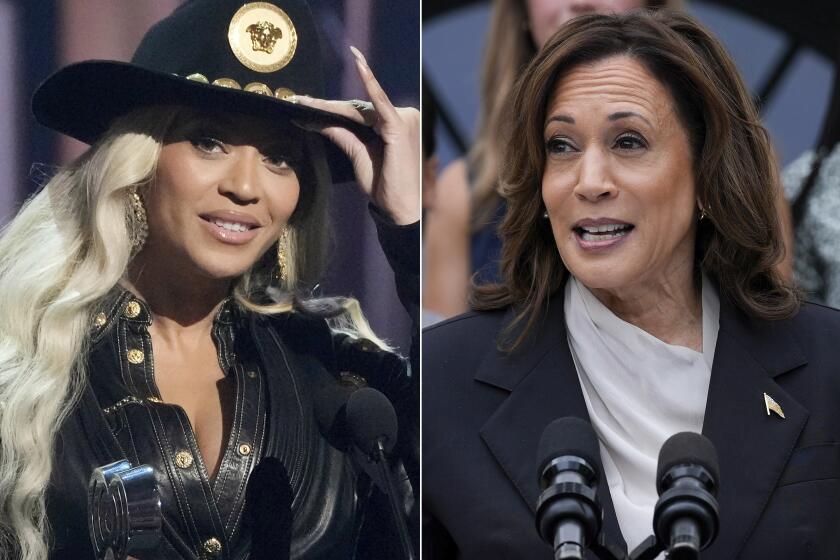Bills May Be Rushed to Davis’ Desk
Faced with the growing possibility that Gov. Gray Davis may not be in office much longer, some Democrats in the Legislature are preparing to rush favorite bills with hopes of having them signed before Davis faces a recall election in two months.
Among bills being talked about for early action are proposals that would give domestic partners virtually all of the benefits of married couples, and another that would require employer-paid health-care coverage for the working poor.
“There is a new reality,” said Sen. Dede Alpert (D-Coronado), chairwoman of the Senate Appropriations Committee.
“We’d spent a lot of time in denial about this.... No one thought the recall would qualify for the ballot,” she added. “Gray Davis might not be governor after Oct. 7. We have no clue who might be chosen as governor.”
The governor has until Oct. 12 to sign or veto bills sent to him by the Legislature, which will adjourn the first half of its two-year session Sept. 12.
As more candidates join the recall race, including Republican actor Arnold Schwarzenegger and Democrats Lt. Gov. Cruz Bustamante and Insurance Commissioner John Garamendi, some legislators worry that the only hope for some of their bills to become law is to get them on the governor’s desk before the recall election.
Davis spokesman Steve Maviglio did not say whether the governor would support the efforts to fast-track bills. But he warned that if “the Republicans are successful ... bills that protect choice, the environment and health care will undoubtedly get vetoed.”
Most bills require only a simple majority vote in the Assembly and Senate. Because Democrats control both houses, it’s possible they could get bills to Davis over the next two months. But some legislation, including that involving taxation, requires a two-thirds vote. Democrats are just shy of that majority in both houses.
It remains unclear whether Davis would want to focus on partisan legislation during a heated campaign to keep his job.
Some Democrats are worried about the idea of pushing bills too quickly.
“What we need to do is focus on our jobs and not just rush to pass 1,000 bills,” said Darrell Steinberg (D-Sacramento), chairman of the Assembly Appropriations Committee.
Instead, Steinberg said, the Legislature should choose a few high-priority issues to deal with during the final few weeks of the session. He suggested that such issues could include workers’ compensation reform, universal health coverage and reforming the structure of revenue and taxation so that California never again gets itself into the mess of a $38-billion budget shortage.
Senate President Pro Tem John L. Burton (D-San Francisco) said that although some Democrats are talking about making a big push of their bills to Davis’ desk, “I don’t think there will be a rush to judgment.”
At issue are mostly bills that did not have enough votes for approval so far in this session, as well as those requiring fine tuning. Those bills ordinarily would be considered dead for this year, but under the Legislature’s rules, they can get a second chance for life at the 2004 session.
Among measures that are potential candidates for action next year are labor-sponsored bills to increase the minimum wage and improve public employee pensions.
Also tagged for action in 2004 is a far-reaching proposal by Sen. Sheila Kuehl (D-Santa Monica) that would create a government-run program to provide health insurance coverage to every Californian.
Kuehl said Thursday that work on her Senate-approved health-care bill is far from finished in the Assembly. She said she would not seek its approval this year, regardless of the recall election.
She also said it would be a mistake to leapfrog some bills ahead of others “unless there is a consensus” to do so or unless the governor “sends a signal he wants a bill because of the recall.”
“We don’t want to be accused of rushing a few bills through in a panic,” Kuehl said. “We don’t want it to appear that we are giving into recall bullying by changing our strategy. The most important thing is the recall and defeating it.”
Burton said two major issues -- a plan to provide employer-paid health care insurance to the working poor and proposals to make workers’ compensation insurance less costly to employers and more effective for injured employees -- would be dealt with quickly before Sept. 12, but not be part of any big push spurred by the recall.
More to Read
Get the L.A. Times Politics newsletter
Deeply reported insights into legislation, politics and policy from Sacramento, Washington and beyond. In your inbox three times per week.
You may occasionally receive promotional content from the Los Angeles Times.






